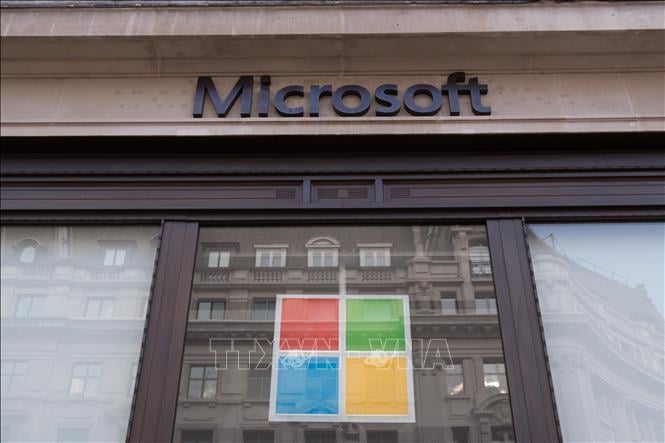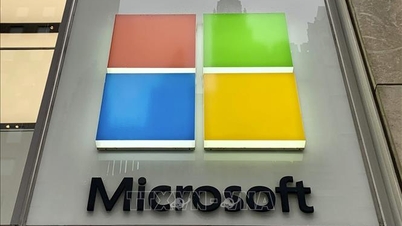
Microsoft Corporation reported quarterly revenue increased 18% to $77.7 billion, exceeding analysts' forecasts, primarily driven by strong demand for AI-integrated cloud services. Cloud revenue reached $49.1 billion (up 26%), with Azure growing by as much as 40%.
However, Microsoft shares fell nearly 4% in after-hours trading due to concerns about the increasing cost of investing in AI. The company recorded record capital spending of $34.9 billion in the quarter, and expects that figure to increase further in the current fiscal year.
Microsoft said investments in data infrastructure and its partner OpenAI – in which it currently holds a 27% stake – resulted in a $3.1 billion decrease in net profit. Despite this, Microsoft's market capitalization still surpassed $4 trillion after the two companies renewed their cooperation agreement.
Chief Financial Officer Amy Hood stated that this was "a strong start to the fiscal year, exceeding expectations for revenue, operating profit, and earnings per share."
Meta Platforms, the owner of Facebook, Instagram, and WhatsApp, reported a sharp drop in net profit due to a $16 billion special tax bill resulting from a new US tax law. Without this tax, the company's profit would have been $18.6 billion.
Revenue for the quarter increased 26% to $51.2 billion, exceeding forecasts, amid Meta's increased spending on AI and virtual reality (VR) devices. The company projects investment spending of $70-72 billion in 2025, higher than previously projected.
Meta CEO Mark Zuckerberg emphasized the goal of making the corporation the world's leading AI lab, with products geared towards personal superintelligence and AI-integrated smart glasses platforms. However, the Reality Labs division – responsible for developing VR/AR technology – continues to suffer heavy losses.
In South Korea, Samsung Electronics announced a net profit of 12.22 trillion won (US$8.6 billion) in the third quarter, a 21% increase year-on-year, far exceeding analysts' expectations.
Revenue reached 86.06 trillion won (US$60.5 billion, up 8.8%), with the semiconductor segment recording a record profit of 7 trillion won (US$5 billion), thanks to strong sales of HBM3E memory chips for AI data centers. Samsung also began shipping HBM4 chips to major customers.
The mobile device (DX) segment posted a profit of 3.6 trillion won (US$2.5 billion), driven by increased sales of the Galaxy Z Fold 7 and tablets. However, the display (TV) segment incurred a loss of 100 billion won (US$70.3 million) due to intense competition.
In contrast to Samsung, SK Telecom, South Korea's largest mobile carrier, reported a net loss of 166.7 billion won ($117 million) in the third quarter. Revenue fell 12.2% to 3,970 billion won ($2.8 billion), significantly lower than market expectations.
The business results of major players show that AI continues to be a key driver of global technology growth, especially in the cloud computing and semiconductor sectors. However, infrastructure investment costs and profit risks are causing concern among investors. Experts warn that the technology industry is entering its most expensive investment cycle, as businesses race to expand their computing capacity to embrace the AI era.
Source: https://baotintuc.vn/kinh-te/doanh-thu-cac-ong-loncong-nghe-tang-manh-nho-nhu-cau-ai-20251030134642933.htm


![[Photo] Prime Minister Pham Minh Chinh receives the Governor of Tochigi Province (Japan)](/_next/image?url=https%3A%2F%2Fvphoto.vietnam.vn%2Fthumb%2F1200x675%2Fvietnam%2Fresource%2FIMAGE%2F2025%2F12%2F16%2F1765892133176_dsc-8082-6425-jpg.webp&w=3840&q=75)
![[Photo] Prime Minister Pham Minh Chinh receives Lao Minister of Education and Sports Thongsalith Mangnormek](/_next/image?url=https%3A%2F%2Fvphoto.vietnam.vn%2Fthumb%2F1200x675%2Fvietnam%2Fresource%2FIMAGE%2F2025%2F12%2F16%2F1765876834721_dsc-7519-jpg.webp&w=3840&q=75)
![[Image] Leaked images ahead of the 2025 Community Action Awards gala.](/_next/image?url=https%3A%2F%2Fvphoto.vietnam.vn%2Fthumb%2F1200x675%2Fvietnam%2Fresource%2FIMAGE%2F2025%2F12%2F16%2F1765882828720_ndo_br_thiet-ke-chua-co-ten-45-png.webp&w=3840&q=75)


![[Live] 2025 Community Action Awards Gala](/_next/image?url=https%3A%2F%2Fvphoto.vietnam.vn%2Fthumb%2F1200x675%2Fvietnam%2Fresource%2FIMAGE%2F2025%2F12%2F16%2F1765899631650_ndo_tr_z7334013144784-9f9fe10a6d63584c85aff40f2957c250-jpg.webp&w=3840&q=75)































































![[Video] Independence and self-reliance linked with international integration through 40 years of reform](https://vphoto.vietnam.vn/thumb/402x226/vietnam/resource/IMAGE/2025/12/16/1765899635777_1-1-8054-png.webp)


































Comment (0)